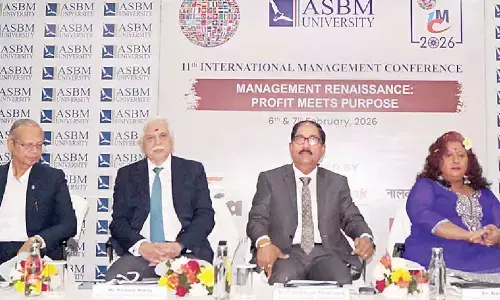Social innovations gaining traction, but more funding needed to sustain it

Viiveck Verma, Founder, UpSurge Enterprise Solutions
The problem is that most incubators support openly commercial ventures and relatively little funding is diverted to grassroots innovation and social entrepreneurship
The ambits of social innovation and entrepreneurship are tremendous, since all facets of human society are beset with problems which need solutions. In particular, social innovation can be instrumental in curbing environmental degradation, generating more employment and incomes, eliminating gender disparity and providing better services to the people. Viiveck Verma, founder, UpSurge Enterprise Solutions, in an exclusive interview with BIZZ BUZZ talks on the state of social entrepreneurship in Telangana and how social innovators are bringing positive change in the society
Social innovations seem to be gaining traction these days. What is the reason for this? What is the idea behind social entrepreneurship?
Social entrepreneurship essentially implies a commitment to the larger structures we inhabit- social, cultural and environmental. It's marked by an acknowledgment that we don't do business or create value in a vacuum and owe substantial contributions to the communities of which we are part of. Social innovations are gaining traction these days because there seems to be a growing realisation about the same prerogatives and responsibilities, and there is an embracing of the need to equip business with a larger purpose.
In which sectors and areas, social innovations and social entrepreneurs have a major role to play?
The ambits of social innovation and entrepreneurship are tremendous, since all facets of human society are beset with problems which need solutions. In particular, social innovation can be instrumental in curbing environmental degradation, generating more employment and incomes, eliminating gender disparity and providing better services to the people. Thus, from pharmaceuticals to academia and from provision of essentials to microfinance, all areas are possible sites for social innovation.
How the social innovation segment is doing in Telangana? Could youlist out some outstanding social impact startups…
The social innovation domain in Telangana has taken exemplary strides. Since 2016, an innovation policy that focuses on public-private partnerships to build adequate networks and infrastructure has been in place, and a bunch of initiatives including the Government Mentorship Program, T-Innovation Utsavam, T-IDEA incentive scheme which emphasizes online applications, the Innovation Yatra, Village Innovation Challenge, School Innovation Challenge have all been crucial in establishing the ease of doing business in the State. Noteworthy social enterprises include AnyTimeLoan, CredRight, DocTalk and so on, all of which are committed to diverse goals and provide a range of services. Two of them that I am connected with and are noteworthy are HesaTechnologies Pvt Ltd – It is into phygital last mile connect for buy/sell in rural area through physical network of micro entrepreneurs connected on their technology platform and MAKSPay Fintech Solutions Pvt Ltd– It is developing a mobile application which would help the marginal and underserved community access to formal bank credit, building a digital loan application, underwriting, disbursement and collections system for marginal workers.
Telangana has a widely appreciated startup policy. How the Telangana government is promoting social and rural entrepreneurs? What are the incentives it offers?
Among several noteworthy policies, I will list a few in particular. In February 2021, Telangana Chief Secretary Somesh Kumar launched the Telangana Social Startup Network (TSSN), which aims to set up 5,000 startups in the next five years, with particular focus on the promotion of social startups. In the same month, the government invited applications from State-based startups to avail incentives such as performance grant, patent expenditure reimbursement, SGST (State goods and services tax) reimbursement and recruitment assistance, among others. The Telangana State Innovation Cell (TSIC) launched the 'Intinta Innovator' programme to support rural innovation, which felicitated and supported grassroots innovators like Vishwaja Reddy from Karimnagar who started a company HiCode that makes napkin incinerators and napkin vending machines. TSIC has also worked on a framework document for Social Innovation and Impact which is circulated to all stakeholders. T-Hub, Telangana government's startup support system, as an innovation intermediary and business incubator has helped over 1,120 startups in the State.
There seems to be lack of funding ecosystem for social entrepreneurs in Hyderabad. How can this be resolved?
In general, the problem is with the fact that most incubators support openly commercial ventures and relatively little funding is diverted to grassroots innovation and social entrepreneurship. Most initiatives in social innovation are funded through donor finance and a substantial part of the financial appropriation that has been taken since the formation of the new State of Telangana is centrally managed. There is a need to decentralise fiscal activity to the rightful stakeholders, build infrastructure and bolster human capital to attract more funding and sustain it. There is also a need to get some of the investors who invest in commercial ventures to also start moving some of their investments towards social impact investing.
What advises do you offer for aspiring social entrepreneurs?
It is necessary to have a vision and a commitment to social purpose and simultaneously the strategy to monetise it correctly. Impact and scale are to be achieved through ethical generation of reasonable profits and thus, tenacity and strategy will both go a long way in empowering your endeavour. Do not let initial failure or challenges bog you down and treat everything as an experience for learning. Last but not least sustainability is very important, and they should focus on that.
There is a criticism that some people are using social innovation area to gain profits. What is your take on this?
We need to understand the difference between profit and profiteering. While the former is simply the difference between incomes and expenditures and has to be made for any business to stay afloat, expand and make an impact, the latter is the making of unreasonable profits through unethical means. It is the latter which is the problem. Profits can be made ethically and have to be made compulsorily to survive and to enlarge the impact any endeavour makes. Just because of a few bad apples we can't classify the entire sector to be bad.
Ongoing Covid-19 pandemic has impacted all walks of life. How did it impact the social innovation space?
This Covid-19 period is a crucial time for social innovation as in dire times, the world needs innovators and leaders who are practical and committed to ground realities. From battling food insecurity to the provision of crucial information, social entrepreneurs have played an instrumental role in fighting the crisis, by not simply providing relief but by also providing hope by carrying life on despite the precarity. More than ever, the space is full of energy and should be supported with adequate funding to flatten the trouble brewed by the viral spread.
Atal Innovation Mission, NITI Aayog and United Nations Development Programme (UNDP) launched Youth Co:Lab 2020-21 India to encourage social entrepreneurs. Was that initiative useful?
Initiatives like Youth Co:Lab are always welcome as in the first place, they generate awareness about entrepreneurship and energise the youth to engage with it and innovate. The programme helped over 8,000 social entrepreneurs and was definitely a step in the right direction.
How the new generation technologies like AI, machine learning can help in executing social innovations in the society?
Technology offers a brilliant opportunity for public-private partnership and collaboration as from registration to procurement, once ties are digitised, allocation of resources becomes easy and communication becomes proactive between startups and the government. AI also enables instant evaluation of efforts and availability of useful information which can be acted on, all of which benefit the social innovation space.
How can India fuel entrepreneurial spirit among students?
Among the first changes to be made is a change in the way education is imparted. Students must be provided with opportunities to pursue education that is practical and linked to employability and skill development. Everyone is a potential entrepreneur and a social innovator, since all of us owe to the society and are capable of planning, organisation and setting goals. The day students, equipped with skills are made aware of this, an entrepreneurial spirit will be as ubiquitous as it can get. Apart from this, there must always be a possibility for mentoring and institutional support by authorities and organisations to help students take their first leaps.
What efforts Telangana is making on this front?
There are quite a few, but off the top of my head, I'll mention two recent ones. TiE Hyderabad has launched student entrepreneurship programmes, which involves concepts being delivered through virtual classes and workshops. Earlier this year, T-Hub on announced that its academic membership programme 'T-Tribe' has enabled 800-plus student entrepreneurs in association with 18 leading institutions from across India. In general, since there is a robust culture of startup incubation in Telangana, students are likely to find the support they need.
It seems graduates from IITs, IIMs are getting preference when it comes to angel, venture capital funding. Why is it so?
Academic credentials continue to hold a massive appeal in India and thus, belonging to a prominent institution bolsters your credibility. Strong alumni networks also provide crucial guidance and access to circles which matter. Since angel and venture capital funding are all about strengthening a startup in its initial phases particularly, investors go for people with credentials because credibility and long-term growth are often seen as linked. This trend however is slowly changing towards impact creation and creative solution which need not necessarily be only restricted to premier institutions.











